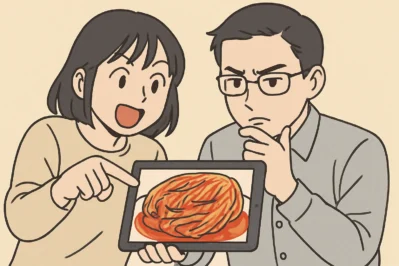Sound Like a Pro: Critiquing K-Food Documentaries!
Hello! This is Maeil Hangul, here to upgrade your Korean skills!
Have you ever watched a movie or a show and wanted to discuss it in Korean like a native speaker? Today, we’re going to learn how to do just that! We’ll focus on expressing your opinions and critiques, especially for food documentaries. Lately in Korea, high-quality food documentaries like Netflix’s “Samgyeopsal Rhapsody” are a huge hit, and people love sharing their detailed reviews online. With these expressions, you can join the conversation and sound like a true food connoisseur!
Core Expressions You Need to Know
Here are three key expressions that will take your critique from simple to sophisticated.
1. -(으)ㄴ/는 반면에 (While / On the other hand)
- Pronunciation [Romanized]: -(eu)n/neun ban-myeon-e
- English Meaning: While… / On the other hand… / Whereas…
- Detailed Explanation: This grammar pattern is essential for creating a balanced critique. You use it to connect two clauses that have contrasting or opposing ideas. It shows that you can see both the good and the bad, making your opinion sound more thoughtful and objective. It’s perfect for a B2 level learner who wants to express more complex thoughts.
2. 인상 깊다 (To be impressive/memorable)
- Pronunciation [Romanized]: in-sang gip-da
- English Meaning: To be impressive / To be memorable / To leave a deep impression.
- Detailed Explanation: This is the perfect phrase to use when a particular scene, interview, or fact really stood out to you. It’s stronger than just “좋다” (good) or “재미있다” (interesting). It means something touched you or made you think deeply. You can use it for movies, art, books, or even a person’s speech.
3. 시사하는 바가 크다 (To have significant implications)
- Pronunciation [Romanized]: si-sa-ha-neun ba-ga keu-da
- English Meaning: To have significant implications / To suggest a lot.
- Detailed Explanation: This is a fantastic, high-level expression that will make you sound very intelligent! You use it when you want to talk about the deeper meaning or the wider message of the documentary. It implies that the show isn’t just about food, but also about culture, society, or history. Using this will definitely impress your Korean friends.
Example Dialogue
Let’s see how these expressions work in a real conversation. Two friends, Min-jun and Ji-hye, are talking about a new documentary on the globalization of kimchi.
- 민준 (Min-jun): 지혜야, 새로 나온 김치 다큐멘터리 봤어? 나는 정말 인상 깊게 봤어. 특히 세계 여러 나라의 셰프들이 김치를 활용하는 장면이 멋지더라.
- Ji-hye, did you see the new kimchi documentary? I found it really impressive. The part where chefs from around the world used kimchi was especially cool.
- 지혜 (Ji-hye): 응, 나도 봤어. 영상미가 뛰어난 반면에, 김치의 역사에 대한 설명이 조금 부족해서 아쉬웠어.
- Yeah, I saw it too. While the cinematography was excellent, it was a bit of a shame that the explanation of kimchi’s history was a little lacking.
- 민준 (Min-jun): 맞아, 그 점은 나도 동의해. 그래도 한식이 세계화되는 과정을 보여주면서 시사하는 바가 큰 다큐멘터리라고 생각해.
- Right, I agree on that point. Still, I think it’s a documentary that has significant implications, showing the process of Korean food becoming globalized.
Culture Tip & Trend Deep Dive
In Korea, people don’t just consume content; they actively discuss and critique it. This is called “리뷰 문화” (review culture). After a popular show like “A Nation of Broth” (국물의 나라) airs, online communities and YouTube are flooded with reviews.
What’s interesting is that many of these amateur reviews use professional-sounding language like we learned today. Using a phrase like “-(으)ㄴ/는 반면에” shows you have a balanced view, and dropping a term like “시사하는 바가 크다” shows you’re thinking about the big picture. If you use these expressions when discussing a popular show, you’ll sound just like a trendy Korean netizen sharing their sharp insights!
Wrap-up & Practice Time!
Great job today! We’ve learned how to express a balanced opinion with -(으)ㄴ/는 반면에, talk about what moved us with 인상 깊다, and discuss deeper meanings with 시사하는 바가 크다. You’re now ready to write your own reviews!
Let’s test your knowledge:
- Fill in the blank:
The food looked delicious, ______, the music was a bit too loud.
(음식은 맛있어 보였던 ________, 음악이 조금 시끄러웠어요.) -
Make your own sentence:
Think about the last movie or drama you watched. What part was the most memorable? Try making a sentence using 인상 깊다.
Leave your answers in the comments below! We’d love to see you use your new skills. Happy learning






